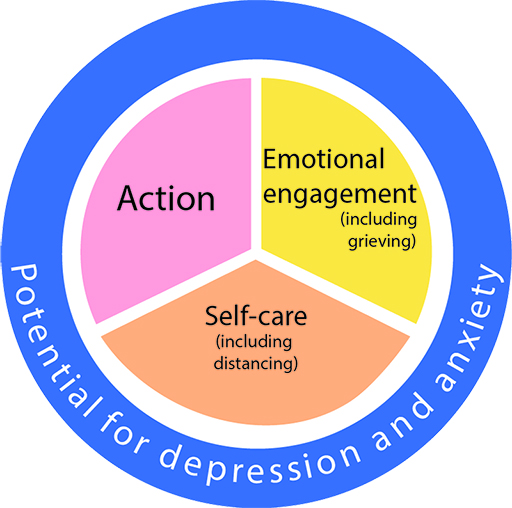2.2 Self-care
Taking care of yourself physically, emotionally and spiritually is an important part of living with the climate crisis. Restorative practices such as meditation, yoga, getting enough sleep, taking holidays and time off, and spending time with family and friends are all important activities to build into your life.
Communities of care
Activist Charlie Hertzog Young says the most important support we need once we awaken to the reality of the climate crisis is to find communities of care (Gen Dread, 2023). These could be close family and friends, neighbourhoods, formal and informal support groups and networks of like-minded people. Through his own personal experience he argues that being part of communities of care helps with climate-related mental health issues:
what appears over and over again as a foundation for collective wellbeing and resilience is a dense, mutually supportive web of relationships – just like any thriving ecosystem.
Distancing
Sometimes, you will need respite from engaging with the reality of the climate crisis and the difficult emotions it can evoke. This kind of distancing, when done consciously, is different from the more unconscious states of denial you learned about in Week 3.
Spending time in nature
We know that this can be a great stress reliever. If you don’t have access to natural environments outside, what can you do to bring nature indoors – plants, flowers, pictures? Even watching documentaries for instance can help us to feel connected. Remember the window of tolerance and the importance of soothing to keep us present, connected and resilient. You learned about ecopsychology in Week 1; strengthening our connection with the natural world is part of addressing the hyper-separation that ecopsychologists believe has led to the climate crisis.
Think about what you love about your life.
It may not seem directly related, but you need to calm your mind before ideas about how to make a difference can come to you. This involves developing what psychologists call ‘meaning-focused coping’ (Ojala, 2016), which can include everything from thinking about what you appreciate in your work or family or the natural world around you, to enjoying weekly walks with a friend. It is important to continue to enjoy these things, engaging in activities that are meaningful, finding new activities that are enjoyable, or finding new relationships. It is about grounding ourselves in the present. Remember, being grounded in the present helps us stay in our window of tolerance, while also keeping an eye on the future and discovering what matters most to us. We can make space for joy and happiness.
Activity 5 Personal action plan
Having come to the end of this course, you are invited to make your own personal action plan to help you to live with the climate crisis. Think about the three interlocking circles to help you to do this:
Emotional engagement
- How will you make time to reflect on your feelings?
- Who can you talk with about your feelings?
Action
- What can you do to make changes to live in a more environmentally sustainable way?
- What community actions can you take?
- What political actions can you take?
Self-care
- What practices will help you to stay well physically, emotionally and spiritually?
- What warning signs do you need to be aware of that may signal you need to distance yourself for a while?
So how do we engage with climate change and ecological destruction? The penultimate paragraph of the book Climate Psychology: A Matter of Life and Death lays out a range of responses:
Do we engage by keeping our head firmly in the ground? Or leap to forms of action that, manic in nature, are likely to burn us out and piss others off? Are we overwhelmed by a visceral fear of imminent catastrophe? Do we hold stubbornly to a touching faith in the capacity of business, science and government to find the solutions? Do we reckon that we’re all doomed and decide to disappear into a spiritual retreat? Do we conclude that if the ship is going down then we may as well party? These are all different forms of engagement with the issue.

